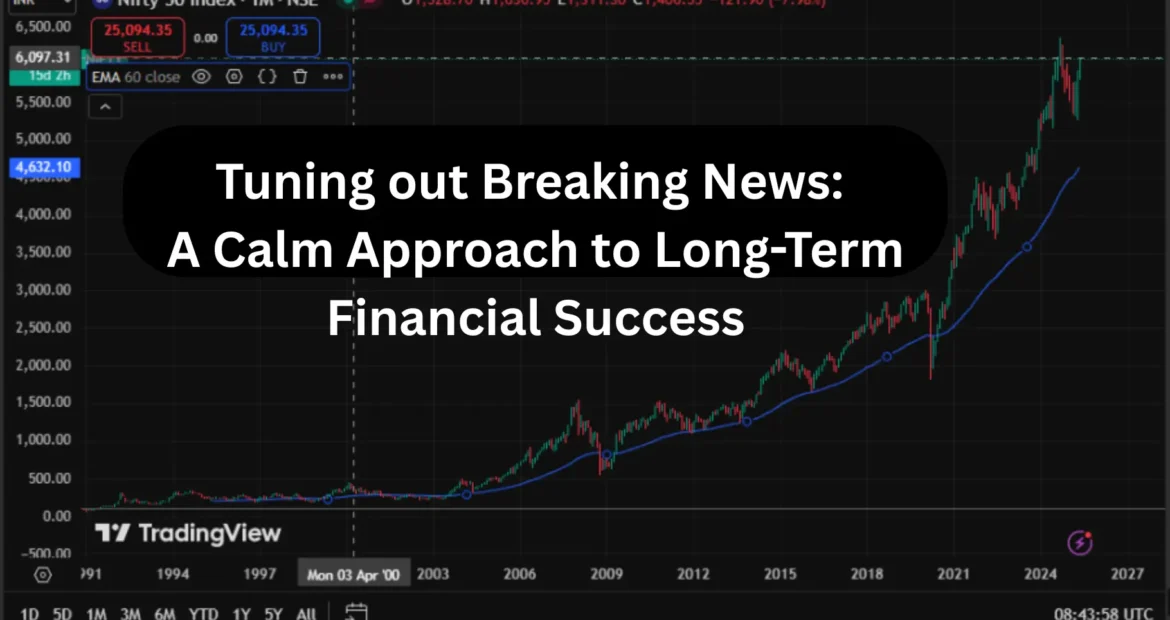In the fast-paced world of personal finance, breaking news often feels like a storm that threatens to upend our carefully laid plans. Over the past decade, we’ve witnessed a series of headline-grabbing events – Demonetization in 2016, COVID-19 pandemic in 2019-20, Russia-Ukraine conflict starting in 2021, and more recently in 2025, tariff rate changes and India-Pakistan tensions. Each of these events sent shockwaves through financial markets, triggering sharp reactions from investors. While these moments of uncertainty may seem overwhelming in real time, history teaches us a valuable lesson: Every piece of breaking news comes with an expiry date.
The Market’s Reaction to Breaking News
When major events unfold, markets often respond with volatility. Stock indices may dip, portfolios may take a hit, and panic can set in. In hindsight, however, these events often appear far less catastrophic. The market’s long-term trajectory has consistently proven resilient, rebounding from disruptions and continuing its upward climb. For instance, the 60 EMA (Exponential Moving Average) of the Nifty 50 Monthly chart has historically trended upward, reflecting the market’s ability to recover and grow over time. (Please refer to the blue line in the below chart)
Nifty 50 – 60 EMA

Yet, during periods of uncertainty, staying calm is easier said than done. The barrage of news updates, market fluctuations, and speculative commentary can create a sense of urgency, tempting even the most disciplined investors to make impulsive decisions. Selling off investments in a panic or chasing short-term gains often leads to regret, as emotional decisions rarely align with long-term financial goals.
The Pitfall of Over-Monitoring Your Portfolio
One of the biggest culprits behind emotional investing is the habit of checking your portfolio too frequently. In today’s digital age, real-time access to market data and investment apps makes it tempting to monitor your portfolio daily—or even hourly. However, this constant vigilance can amplify anxiety and distort your perspective.
Small, short-term fluctuations can feel like major setbacks, and the pressure to “do something” can lead to hasty decisions that undermine your financial strategy. Frequent portfolio reviews also fuel unrealistic expectations. When markets are soaring, you might feel invincible and take unnecessary risks. Conversely, during downturns, fear can drive you to sell at a loss, locking in declines that could have been temporary. This cycle of anxiety and reaction is a recipe for poor investment outcomes.
The Simple Solution: Stay Calm and Stay Invested
So, how can you shield yourself from the emotional rollercoaster of market volatility? The answer lies in adopting a disciplined, long-term approach to personal finance. One effective strategy is to reduce the frequency of portfolio reviews. Instead of checking your investments daily or weekly, consider reviewing your portfolio once in a year. This will allow you to focus on the bigger picture rather than short-term noise.
By spacing out your portfolio reviews, you give your investments time to weather temporary market dips and benefit from long-term growth. This approach minimizes the temptation to react impulsively to breaking news or market swings. It also helps you maintain a clear focus on your financial goals, whether you’re saving for retirement, a home, or your children’s education.
Practical Steps for Long-Term Success
To stay calm and stay invested, consider these actionable tips:
- Set Clear Financial Goals: Define your investment objectives and time horizon. A clear plan keeps you grounded during turbulent times.
- Diversify Your Portfolio: Spread your investments across asset classes like equities, bonds, and fixed-income instruments to reduce risk.
- Automate Investments: Use systematic investment plans (SIPs) to invest regularly, regardless of market conditions. This promotes discipline and reduces the urge to time the market.
- Limit News Consumption: Stay informed, but avoid getting swept up in sensationalized headlines. Focus on credible sources and long-term trends.
- Work with a Financial Advisor: A professional financial advisor can provide objective guidance and help you stick to your strategy during volatile periods.
The Power of Patience
In personal finance, patience is not just a virtue—it’s a superpower. Markets will always react to breaking news, but those reactions are often short-lived. By resisting the urge to micromanage your portfolio and focusing on the long term, you can navigate uncertainty with confidence. The historical data speaks for itself: staying invested through market cycles has consistently rewarded those who remain disciplined.
As you build and manage your wealth, remember that financial success is not about outsmarting the market or predicting the next big event. It’s about staying committed to your plan, trusting in the resilience of well-constructed portfolios, and giving your investments the time they need to grow. So, the next time breaking news shakes the markets, take a deep breath, step back, and let patience guide your path to financial security.
“Stay calm, stay invested, and let time work its magic“
–Author–
Raghu Prasad R,
Certified Financial Planner.













